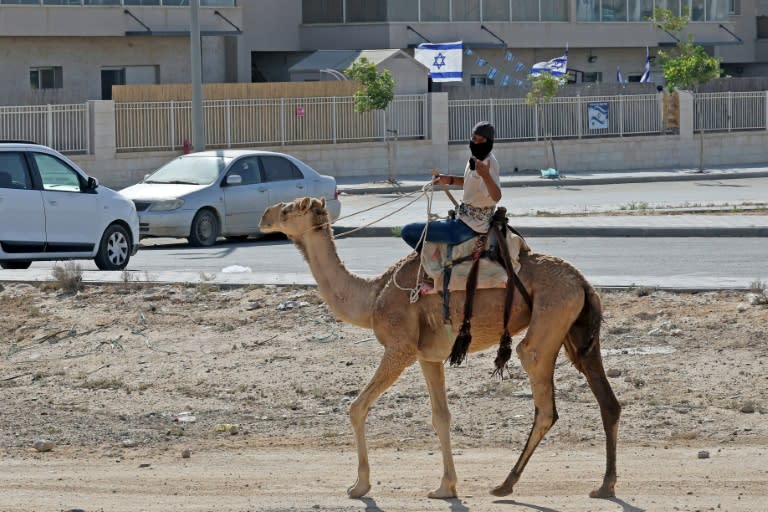Israel's Bedouin fight eviction in desert region

Plans to expand Israel's desert city of Dimona, known as the cradle of the national nuclear programme, are stoking fears among nearby Bedouin villagers for their traditional way of life.
When Hassan Hawashla looks out his window, he sees rows of identical modern apartment blocks, and construction cranes building more, as Dimona spreads into the surrounding Negev desert.
"Every day when I look at this city, it's getting closer and closer to us," said Hawashla, 40, who himself is among the construction labourers working in Dimona.
His own Bedouin village of Ras Jrabah is an informal settlement of tin-roofed houses and a few concrete buildings, crisscrossed by dusty dirt roads and home to about 500 people.
Any new construction there gets promptly torn down by Israeli authorities who object to any permanent structures being built and want to move the entire village, Hawashla said.
Dimona, located 80 kilometres (50 miles) south of Jerusalem and with a population of about 36,000, meanwhile has ambitious plans to nearly double in size, local government documents show.
Israel's Bedouin, a nomadic Arab ethnic group, see it as yet another threat after long living on the margins of Israeli society, often in poverty and with few opportunities.
About 30 percent of the Bedouin population live in dozens of similar villages in the Negev desert, which is known as Naqab in Arabic, says the Israeli non-profit group Bimkom.
Another Bedouin village, Wadi al-Khalil, was wiped off the map last month after Israeli authorities ordered its demolition to clear space for a highway expansion.
- 'Minimum land' for Bedouin -
Dimona, originally known as the cradle of Israeli nuclear power due to its nearby Negev Nuclear Research Center, is now planning a construction boom.
"All the money goes into the buildings, but the buildings are empty," said Hawashla.
Meanwhile, he said his own village receives no services from the government -- not even bomb shelters to protect it from rockets fired from war-torn Gaza, 70 kilometres away.
Israeli authorities did not respond to AFP requests for comment by the time of publication.
Israeli authorities have told residents of Ras Jrabah to move across town to Qasr E-Sir, a recognised Bedouin locality on the western side of Dimona, according to Hawashla.
But Hawashla's father Freij told AFP that the villagers do not want to move there because of strained relations with a different Bedouin group that lives there.
"This tribe doesn't want us and we don't want them either," said Freij, who was born in 1939 before Dimona was founded.
The old man recalled that, when the first Jews came to the area and he was a child, the Bedouin gave them water, bread and yoghurt.
Another man from the region, Marwan Frieh, said his father and grandfather were born and raised in an unrecognised village before Israeli authorities forced them into Rahat, the largest Bedouin town of the Negev.
Frieh now monitors cases such as Ras Jrabah and other villages through Adalah, a group that fights for the rights of Arabs in Israel.
He said that 11 unrecognised Bedouin villages representing 6,500 people are now fighting eviction orders in courts.
Frieh said Israeli land policy in the region amounted to "maximum Bedouin on minimum land, and minimum Jewish on maximum land".
- 'Trespassers on own land' -
The Ras Jrabah community has fought in court to reverse eviction orders, lost and appealed to the Beersheba district court.
The villagers have suggested having their community declared a new neighbourhood of Dimona, an idea authorities rejected.
Myssana Morany, who represented Ras Jrabah during the appeal last week, said there was little chance for the community to win their case.
"The land regime in Israel in general is built in such a way that leads to a situation where the Bedouin community can't prove their ownership on the land," she told AFP.
The court's interpretation of a combination of Israeli, British mandate era and Ottoman laws means Bedouins "are considered to be trespassers on their own lands", she said.
Israeli authorities hold that Bedouins in Ras Jrabah did not have a permanent presence on the land until 1978, court documents show.
Mansour Nasasra, a scholar of Bedouin society in the Negev, said Ottoman and British laws should work in favour of Bedouins.
"Bedouin villages, generally speaking, are categorised as unrecognised villages, despite the fact that those villages existed before 1948, they exist on Ottoman and British records," he told AFP, adding that they paid taxes to both.
In Ras Jrabah, residents said that the issue strikes at the heart of their Bedouin identity.
"I'm an Israeli citizen on paper only," Hawashla said. "I have an identity card and everything, but I don't get the basic necessities that the state of Israel should give me."
lba/jd/mca/fz

 Yahoo News
Yahoo News 
